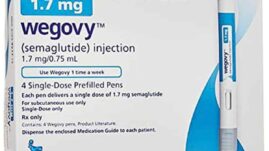Have you recently received a metformin prescription for weight loss, or are you wondering if metformin can help you lose weight?
Metformin is one of the most commonly prescribed diabetes drugs in the United States, with over 92 million prescriptions currently in use.
People typically take metformin if they have type 2 diabetes and are dealing with insulin resistance (a condition in which the body does not use insulin efficiently) and higher-than-normal blood sugar levels.
However, you may also be prescribed metformin “off-label” (for a condition other than that for which it’s officially approved) to help with weight loss.
Let’s take a look at what the research says about metformin and weight loss.

Table of Contents
- How metformin works
- Does metformin cause weight loss?
- How does metformin help you lose weight?
- What is the correct dosage to experience weight loss?
- What is the average weight loss with metformin?
- What to do if you are losing too much weight on metformin
- Can I take metformin for weight loss without having diabetes?
- Alternative weight-loss drugs for people with diabetes
- Final thoughts
How metformin works
Metformin works by lowering the amount of glucose released from the liver, reducing the amount of glucose absorbed by the intestines, and helping insulin produced by the body work better, thereby lowering blood sugar levels.
As your body is better able to metabolize glucose, your risk of diabetes complications such as heart disease, stroke, neuropathy (nerve damage), and retinopathy (eye damage) substantially decreases.
Does metformin cause weight loss?
Although metformin isn’t officially recognized or approved as a weight-loss medication by the U.S. Food and Drug Administration (FDA), research has consistently shown a significant connection between its use and weight loss.
A longitudinal study (a type of research that observes the same people over long periods) published in the journal Diabetes Care concluded that metformin can be successfully taken to lose excess body weight.
How does metformin help you lose weight?
Metformin can help you lose weight for several reasons:
Better blood sugar control
Since metformin is proven to improve insulin sensitivity and thus regulate blood sugar management, people with type 2 diabetes, who often have high blood sugar levels despite high levels of insulin in their bloodstream, may experience modest weight loss with the use of this medicine.
This is mostly because the body will stop releasing excess insulin into the bloodstream and will start to metabolize glucose more efficiently. When insulin resistance goes down, weight often does, too.
However, in a very small proportion of the population (mainly people with previously undiagnosed type 2 diabetes whose HbA1c levels — a measure of glucose control over the previous 2 to 3 months — were extremely high), there may be a modest increase in weight initially.
This is especially true for people who are experiencing diabetic ketoacidosis (DKA, a serious and dangerous condition in which chemicals known as ketones build up in the bloodstream) at diagnosis.
This is a very rare occurrence, because most people with type 2 diabetes at diagnosis are still producing insulin, and so their HbA1c is only slightly elevated.
Furthermore, most people with type 2 diabetes do not experience DKA at diagnosis. They’re resistant to the insulin that’s being released by their pancreas, but their bodies are still producing insulin, which prevents DKA.
Reduced hunger cues
One documented side effect of metformin is reduced hunger, which usually results from a combination of lower amounts of insulin in the blood and fewer blood sugar spikes (which can send hunger soaring).
Metformin has also been shown to reduce hunger cues. A study involving women with type 2 diabetes, not treated with insulin, compared three groups: one receiving a placebo (inactive treatment) and two receiving different doses of metformin.
The group taking the highest dose of metformin (1,700 mg three times daily) experienced notably less hunger before and after meals compared to the other groups. That group was also more likely to eat less than the other two groups.
Even just eating a few hundred fewer calories per day can cause moderate, noticeable, weight loss over time. Eating 200 fewer calories per day for only 18 days can cause you to lose 1 pound of body fat (which is equal to 3,500 calories).
Eating 200 fewer calories per day for an entire year can cause you to lose over 20 pounds. Small, subtle changes can make a big difference.
Learn more: How to Find Your Daily Calorie Need.
Healthier lifestyle habits
Many people may lose weight while taking metformin if they are also incorporating dietary changes and increasing their physical activity at the same time.
Starting a metformin regimen without any lifestyle changes will most likely only lead to a modest drop in weight.
How to lose weight faster on metformin
The following strategies will help accelerate your weight loss if you’ve just started on a metformin regimen:
- Exercise for 30 or more minutes per day, most days of the week
- Incorporate resistance training 2 to 3 times per week
- Switch from sugar-sweetened beverages to water
- Increase your protein intake and lower your intake of added sugars and refined carbohydrates (such as white bread, pizza dough, and white rice)
- Eat plenty of fruits and vegetables
- Increase your fiber intake
- Practice portion control and drink water before meals to increase feelings of fullness
- Get enough sleep (experts recommend 7 to 9 hours a night for most adults)
Work with your doctor to create an eating and activity plan that is a good fit for you and your lifestyle.
Gastrointestinal upset
While not the most pleasant side effect, having an upset stomach, with the accompanying nausea, vomiting, and diarrhea that can sometimes occur, can also contribute to weight loss in people taking metformin, especially when first beginning treatment.
According to a study published in the Journal of Research in Pharmacy Practice, gastrointestinal upset is the main complaint among people who are starting treatment with metformin tablets.
This study notes that gastrointestinal side effects can affect up to 63 percent of people who take metformin. Bloating, nausea, and diarrhea can be so troublesome that a person avoids meals and consequently eats fewer calories, resulting in weight loss.
Read more in: Can Metformin Cause Diarrhea?
If at any point you feel that your weight loss is concerning (for example, if you are having trouble keeping your blood sugar levels stable or out of a dangerously low range), or if you’re becoming dehydrated, contact your doctor immediately or seek emergency medical help.
Decrease in visceral fat
Visceral fat is a dangerous type of fat that surrounds the internal organs and can increase the risk of various health conditions, including heart disease and type 2 diabetes. Metformin can help reduce levels of visceral fat, which may reduce overall body weight.
Bacterial changes in the gut
Recent research suggests that metformin may additionally change the composition of gut bacteria in ways that behavioral changes to lose weight do not, possibly contributing to the weight-loss effects of the medicine.
In the digestive system, specific bacteria are responsible for breaking down short-chain fatty acids, which are important for energy production and blood sugar regulation.
When taking metformin, the types of bacteria that process these fatty acids can become more abundant, resulting in weight loss, according to research in the journal Frontiers in Endocrinology.
Future studies are needed to fully understand if and how gut bacteria play a role in the health benefits of metformin.
Read more: Metformin Side Effects: What You Need to Know.
What is the correct dosage to experience weight loss?
According to the Mayo Clinic, people taking oral extended-release (ER or XR) metformin usually start at a dose between 500 and 1,000 mg daily and work their way up to 2,500 mg daily (not to exceed that amount).
If you are taking metformin for weight loss, work with your doctor to determine the appropriate starting dose for you.
Do NOT increase your dose without your doctor’s guidance, as this can lead to severe side effects, such as nausea, vomiting, diarrhea, bloating, and muscle weakness.
Read more: Metformin Dosage Guide.
What is the average weight loss with metformin?
The typical weight loss after one year of metformin use is only between 4 and 7 pounds. Many people believe that metformin can act as a magic weight-loss pill, but this is unfortunately usually not the case.
If you are dealing with insulin resistance and are ready to make lifestyle changes (such as adopting a healthier diet and starting a regular exercise regimen), speak with your doctor about also incorporating metformin into your routine to aid in weight loss.
But be aware that taking metformin alone will not cause substantial weight loss.
What to do if you are losing too much weight on metformin
If you are taking metformin for insulin resistance but feel that you are losing too much weight (or losing weight when you don’t want to), know that any initial side effects, such as gastrointestinal discomfort, typically go away over time.
There may be other causes contributing to your weight loss, such as:
- Higher-than-normal blood sugar levels
- Ketones in your urine
- Other medications you are taking (certain drugs for thyroid disease, attention deficit hyperactivity disorder [ADHD], or cancer, for example)
- Chronic diarrhea
- Stress
- Anxiety
- Irritable bowel syndrome (IBS)
- Food allergies
- Food intolerances and disorders, such as celiac disease
- Depression
- Infection
If you are losing weight rapidly and don’t know why, call your doctor immediately.
They will be able to help you troubleshoot a solution, and potentially stop your metformin treatment if needed.
Can I take metformin for weight loss without having diabetes?
In some instances, metformin may be prescribed to people who do not have diabetes but are living with prediabetes (a condition in which blood glucose levels are high, but not in the range for a diabetes diagnosis) or insulin resistance. In these cases, weight loss would be a side effect of improving the insulin resistance.
Learn more in: Metformin for Prediabetes: The Pros & Cons.
Talk with your doctor if you think you may be experiencing insulin resistance or decreased insulin sensitivity (a precursor to insulin resistance).
If you don’t have prediabetes or insulin resistance, a doctor may prescribe metformin off-label for moderate weight loss.
There are fewer peer-reviewed studies on the success of using metformin off-label, but many people have found success when using metformin along with a healthier diet and regular exercise.
Alternative weight-loss drugs for people with diabetes
Several newer injectable medicines — Ozempic (semaglutide), Wegovy (semaglutide), Mounjaro (tirzepatide), and Zepbound (tirzepatide) — have been shown to cause significant long-term weight loss. Only Wegovy and Zepbound are currently FDA-approved for weight loss.
Ozempic is approved to manage blood glucose levels in people with type 2 diabetes, and it is also approved to lower the risk of heart attack, stroke, or death in adults with type 2 diabetes and known heart disease. It is shown to cause an average 6 percent to 7 percent weight loss.
See more in: Can You Take Metformin and Ozempic Together?
Wegovy is approved for chronic weight management in adults who are overweight or obese and who also have at least one weight-related health condition.
It is also approved for children ages 12 years and older with a BMI (body-mass index, a measure of weight relative to height) at or above the 95th percentile for their age and gender. This medicine results in an average weight loss of about 15 percent in adults.
Mounjaro is approved for blood glucose management in adults with type 2 diabetes. Research has shown that this medication leads to an average weight loss of about 15 percent to 20 percent.
Like Wegovy, Zepbound is approved for chronic weight management in adults who are overweight or obese and who also have at least one weight-related health condition. At its highest dose, Zepbound has been linked to a roughly 21 percent average weight loss.
Final thoughts
Considering all factors, metformin can cause a modest amount of weight loss of roughly 4 to 7 pounds a year in those who take the medication regularly.
This is why metformin is not classified as a weight-loss drug, but is instead a prescription medication to help people with insulin resistance better manage their blood sugars.
If you are overweight or obese, are taking metformin, and wish to experience sustainable weight loss, work with your doctor to figure out a dietary plan and exercise regimen that will work for you.
They may also recommend one of the newer weight-loss medications (or diabetes medications linked to weight loss) on the market, such as Ozempic, Wegovy, Moujaro, or Zepbound.
If you wish to take metformin solely for weight loss, talk with your doctor to see if you can use it “off-label.” If so, your doctor will work with you to determine the appropriate starting dose.
Keep in mind that once you stop metformin therapy, there is a good chance your weight loss will plateau, and you may even gain back any weight that you’ve lost. This is why it’s important to adopt a healthy diet and regular exercise routine along with taking metformin for weight loss.
Learn more in: Stopping Metformin: When and How You Can Stop Taking Metformin.
If you’re worried about the amount of weight you’re losing while taking metformin, contact your doctor, who can troubleshoot solutions with you, including potentially weaning you off the medication.
Suggested next article: Everything You Need to Know About Metformin.





Raymond A hart
I’ve been prescribed metformin 500mg twice daily cut out all sugars processed food etc lost 15lbs in 2 months feel fantastic
Raymond A hart
I’m 69 years old
Julio Rios
I was diagnosed with Diabetes 2 on October 1st of 2021 and was prescribed Metformin. I followed the recommended dosage religiously and currently take 4x500mg daily. I also immediately changed my diet and followed all recommendations. I am 63 years old and I was an Executive Chef for 35 years, so I felt I knew how to eat healthy. I was wrong!. I cut all starches, sweets, processed meats, glutens, and basically anything containing flour, sugar/processed sweeteners. Portion controlled all meals. Have lost 42lbs in 4 months. Unfortunately I have two bad knees which do not allow me to exercise better, but I feel healthier now than I have in many years!
Sherry Lynn
Thank you, I was just prescribed this today. I hope I do as well as you have.
Caty
May I ask what do you eat for lunch and tea please cause I’m struggling to work out what to eat with Newly diagnosed Diabetes 2, I’m 55 and overweight
Julia Edwards
I have recently joined WW…. formerly Weightwatchers. They have changed the format of their diet and it is diabetic friendly now. It gives a really good structure to meals and helps to plan foods for the day. It is helping me with foods and meals for diabetes.
Ana
Have you tried Chair exercise? Or Yoga Chair. Check YouTube. Good luck.
Gay
Wow, so happy for you. But what exactly do you eat?